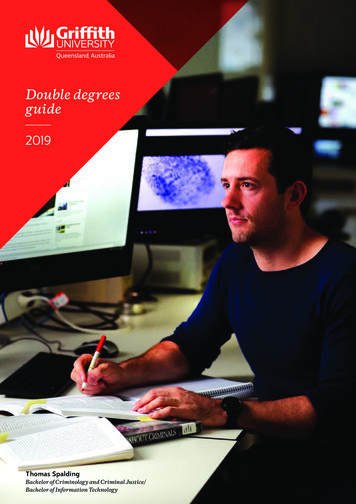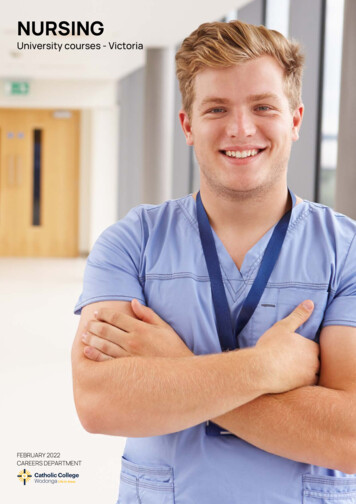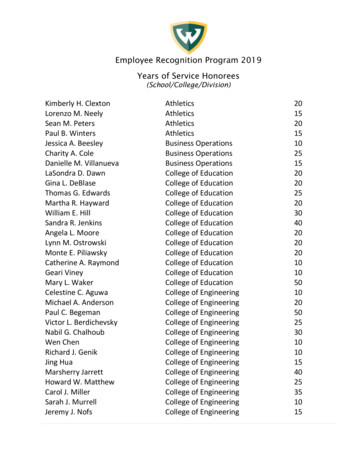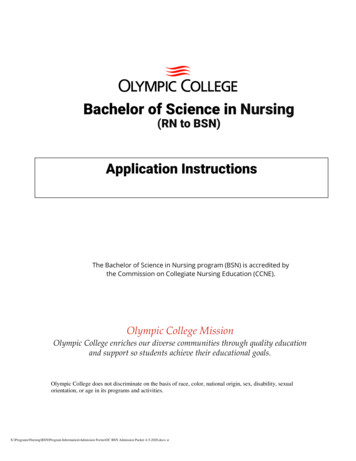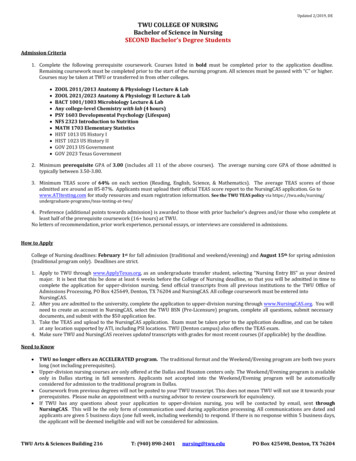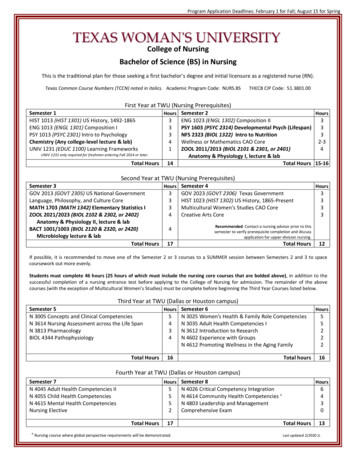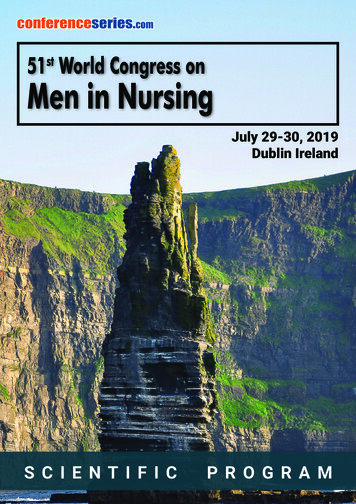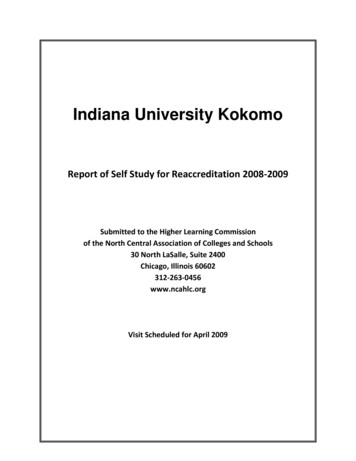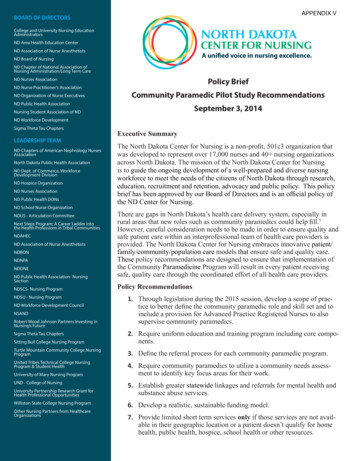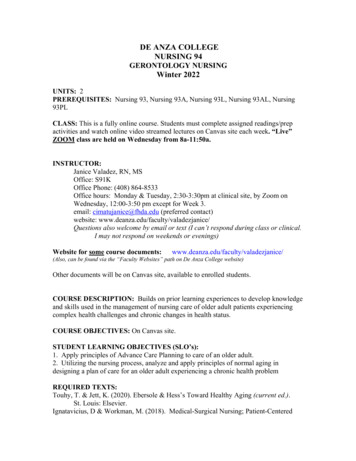
Transcription
College of NursingBachelor of Science in NursingStudent HandbookOfAcademic Policies and Procedures2021-2022Integrating Faith in Learning, Leading, and ServingCharleston Southern University1
BSN Student Handbook of Academic Policies and ProceduresWelcome to the College of Nursing at Charleston Southern University!This handbook for undergraduate students at the College of Nursing provides informationregarding policies, procedures, available resources, and issues that pertain to student academic life.It also outlines the rights and responsibilities of all College of Nursing students. Please note thatinformation in the BSN Student Handbook is updated annually.Students are responsible for using the handbook as a resource when questions arise and as a guideto academic and non-academic policies and procedures. All students are required to sign theHandbook Acknowledgement document and upload the document to their Castle Branch onlinecompliance tracker, which certifies that students are responsible for:a. Reading the handbook to its entirety each yearb. Reviewing and understanding any changes made to the Handbook during the entiretime they are enrolled as a student in the College of Nursingc. Recognizing that changes made to policies and procedures may impact them as astudentChanges in policies may be implemented immediately throughout the academic year, and studentswill be notified of any changes. The information in this handbook is accurate as of August 2021.A copy of the BSN Student Handbook of Academic Policies and Procedures is availableelectronically on the College of Nursing BSN cs/college-of-nursing/nursing/bsn/COVID-19 ConsiderationsIt is strongly encouraged for all nursing students to be vaccinated for COVID-19. Proof of COVID19 Vaccination or signed religious or medical exemption form (per clinical site) is requiredannually while enrolled in courses that include a clinical component.Students who have clinical absences due to COVID-19 will be required to meet with the Collegeof Nursing Compliance Coordinator (virtually) and will be referred to the Dean, BSN Directorand/or ABSN Coordinator for review. Keep in mind that the College of Nursing COVID-19absence make-up policy may differ from the University COVID-19 guidelines due to the clinicalrequirements for each course as designated by the South Carolina State Board of Nursing. If it isdetermined that a nursing student is misusing the COVID-19 absence policy, they will incur aCode of Conduct Violation and/or dismissal from the CON. In certain situations, students may berequired to withdraw without penalty for the semester at the next course offering. This will bedetermined on an individual case-by-case basis with the final decision made by the Dean of theCON.Table of Contents2
BSN Student Handbook of Academic Policies and ProceduresAcademic CalendarFall 2021Spring 20222667Chapter 1 BSN Program BackgroundMissionPurposePhilosophyEnd-of-Program Student Learning ination Policy StatementCollege of Nursing Organizational ChartFaculty and Staff Listing88810111112121314Chapter 2 General Information and PoliciesStudent’s Rights and ResponsibilitiesProgram Minimum Skills for Eligibility to Participate in ProgramsStudent Code of Academic and Professional ConductDefinition of Unacceptable BehaviorIncivility PolicyProfessional Boundaries PolicyCommunication in the College of NursingSocial Media Policy1516181822242425Chapter 3 Student Services and ResourcesChapelStudent OrganizationsFacilities and Services2828292929303031313132323231Clinical LabsStudent LoungeComputer LabsTechnology Code of ConductAdvisorsLibraryFinancial AssistanceBookstoreInclement Weather PolicyPreregistrationChange of Address/Name/TelephoneChapter 4 General Academic Policies3
Grade ScaleClassroom PoliciesLaboratory PoliciesClinical PoliciesTesting PolicyAssessment Testing PoliciesDrug Dosage Exam & ProcedureStandardized Integrated Exams TestingWritten WorkStudent Responsibilities for Administering MedicationsPerformance Enhancement Program (PEP)Promoting Academic Success for Students (PASS)Academic FailureDismissalAttendance at Professional Development ActivitiesVariance from Policies33343535373838393940414242434444Chapter 5 Undergraduate Program DetailsTraditional BSN Curriculum & Suggested SequencingProgram Steps to Graduation and NCLEX Success4546Chapter 6 Compliance Policies and RegulationsFees and ExpensesEnrollmentNCLEX-RN Review CourseTransfer Credit for Undergraduate Nursing CoursesCriminal Background Check for Clinical Education and Learning ExperiencesUnsatisfactory resultsRecord-KeepingStudent RightsDrug Screen Policy and ProcedureSubstance Abuse PolicyImpairment StatementDisability StatementAccidents/Injuries During Clinical ExperiencesCompliance and Health PoliciesHealth InsuranceOther Health PoliciesEmergency Contact PolicyHIPAAConfidentiality PolicyInfectious/Communicable Disease PolicyStudent Rights to Health InformationTransportationProfessional and General Dress Standards for Clinical & 1616263
Voluntary WithdrawalBalancing Educational and Employment DemandsGraduation RequirementsEligibility for RN Licensure64646465AppendicesAppendix A: Student Request for Faculty Letter of RecommendationAppendix B: Code of Conduct Violation FormAppendix C: Student Incident ReportAppendix D: Faculty/Student Communication RecordAppendix E: Approval to Attend Professional Development Activity2021-2022 Academic Calendar56869717273
Fall Semester 2021August 20-22August 23August 23August 27September 2September 6October 1October 8October 10October 11-12October 13October 18October 18-22October 22October 25-29November 5November 24-26November 29December 5December 6December 10December 7-13New Student & Freshman OrientationRegistration and Drop/Add - All StudentsClasses Begin (Day, Evening, Accelerated I & CAPS I)Last Date to Register or Drop/Add Classes for Day, Evening, AcceleratedI & CAPS I before 5:00 p.m.; Last Date to Receive Full Refund of Tuitionif Withdrawing from CSULast Date for 25% Tuition Refund if Withdrawing from CSU before 5:00p.m.; No Refund after this Date (Day, Blended, Accelerated BSN, andEvening)Labor Day (Campus Closed)Last date to withdraw from Accelerated I and CAPS I classes with a gradeof “W” before 5:00pmMidtermAccelerated I and CAPS I classes end and finalsFall BreakDay and Evening classes resumeAccelerated II and CAPS II classes beginAdvisement and Preregistration for Seniors and Juniors starts at 8:00 a.m.Last date to register to drop/add Accelerated II and CAPS II Before5:00pmAdvisement and Preregistration for Sophomores starts at 8 amLast Date to Apply for Spring GraduationThanksgiving Holidays – Campus ClosedClasses ResumeAccelerated and CAPS II Classes end and finalsDay and evening classes endBSN, ABSN, and MSN Pinning CeremonyFinal Exams, Day and Evening ClassesSpring Semester 20226
January 10January 14January 17January 18January 21February 18February 27February 28March 7-11March 14March 18March 21-25March 24March 28- April 1April 4- April 14April 9April 15April 18April 19April 22April 26April 27-May 3April 29May 1May 7Registration and Drop/AddClasses Begin (Day, Evening, Accelerated I & CAPS I)Last Date to Register or Drop/Add Classes for Day, Evening, AcceleratedI & CAPS I before 5:00 p.m.; Last Date to Receive Full Refund of Tuitionif Withdrawing from CSUMartin Luther King, Holiday (Campus Closed)All Classes ResumeLast Date for 25% Tuition Refund if Withdrawing from CSU before 5:00p.m.; No Refund after this DateLast Date to Withdraw from Accelerated I & CAPS I with a grade of “W”before 5:00 p.m.Accelerated I and CAPS I Classes End and FinalsMidtermAccelerated I Classes EndSpring BreakClasses ResumeAccelerated II & CAPS II Classes BeginLast Date to Withdraw with a Grade of “W” in Day and Regular EveningClasses before 5:00 p.m.Last Date to Register or Drop/Add Accelerated II & CAPS II classesbefore 5:00 p.m.; Last Date to Receive a Full Tuition Refund ifWithdrawing from CSU before 5:00 p.m. (Accelerated II only)Advisement and Preregistration for Seniors and Juniors starts at 8:00 a.m.Last Date for Refund of 25% Tuition if Withdrawing from CSU before5:00 p.m. (Accelerated II only)Advisement and Preregistration for Sophomores starts at 8:00 a.m.Advisement and Preregistration for Freshmen starts at 8:00amLast Date to Apply for Summer and Fall GraduationGood Friday holiday (Campus Closed)All classes resumeLast Date to Withdraw with a Grade of “W” in Day and Evening Classesand Last Date to officially withdraw from CSU before 5 p.m.Last date to withdraw from an Accelerated II and CAPS II class with agrade of “W” before 5 p.m.Day and Evening Classes End (Accelerated II and CAPS II Continue)Day and Regular Evening Classes Final ExamsAccelerated II and CAPS II classes end and finalsCAPS II Classes End and Final ExamsCommencement 10 a.m.Chapter 17
BSN PROGRAM BACKGROUNDMISSIONProvide excellence in nursing and health care to individuals, groups, families, and society throughits program of education and service while respecting cultural, ethnic, religious, and individualdifferences and commonalities.PURPOSEProvide a high-quality baccalaureate-nursing program that prepares graduates to:1. Practice safe and high-quality professional nursing in a variety of health care deliverysettings;2. Value lifelong learning for professional, personal, and spiritual growth;3. Demonstrate commitment to service in the community;4. Contribute to the quality and safety of nursing and health care services.PHILOSOPHYThe philosophy of the College of Nursing revolves around developing nurses in a personal,professional, clinical and spiritual sense. The Faculty of the College of Nursing are an integralpart of the Charleston Southern University community. We support the mission and purpose ofthe University to provide an education which encompasses concepts that will determine the qualityof life and equip students for significant roles in leadership, lifelong learning, and service. Thefaculty strive to enhance student academic excellence and Christian character in a Christianenvironment. The faculty prepare graduates with an increased level of critical thinking skills forpersonal and professional decision-making. These skills enable graduates to provide care toindividuals, families, groups, communities, and populations in response to rapidly changing andcomplex social and technologically advancing global environments. The faculty of the College ofNursing believe that:A person is a unique individual, possessing dignity and worth, who is created in the image ofGod. A person is comprised of integrated dimensions of biopsychosocial and spiritual variables,but when examined as a whole is more than the sum of the parts. In the process of self-realization,the person progresses through developmental stages. Each person has innate and acquiredstrengths and limitations which influence the ability to adapt throughout life.The environment is a complex structure composed of systems and subsystems, which interactin the chain of life. Environment encompasses the physical realm of inanimate and animateobjects. The inanimate realm includes the basic elements essential to life. The environment ofhuman community, as part of the animate realm, includes society and its inherent cultures. Culturedefines the person’s values, roles, expectations and behavior. The importance of health to a personmay be influenced by culture. Persons are in constant interaction with the environment. Thesesurroundings are a source of internal and external stressors and resources, which assist or hinderthe person in the adaptation to the environment.8
Health is a dynamic state of being, which is determined by the ability to adapt. Health is ahuman response to stressors in an effort to maintain equilibrium. Adaptation is the process bywhich one attempts to maintain equilibrium. Varying levels of health exist which fluctuate inresponse to interaction with the internal and external stressors in the environment. Failure tomaintain equilibrium results in physical, psychosocial or spiritual disequilibrium.Nursing is an art and science utilizing specialized knowledge. The art of nursing is caring.Caring is the creative and dynamic application of nursing knowledge emphasizing the humanaspect. The science of nursing is built on theoretical foundations acquired from the arts,humanities and the biological, physical and behavioral sciences. The combination of the art andsciences makes nursing a unique practice discipline, which is goal-directed through the use of thenursing process. Nursing process is a scientific method of problem solving, the steps of which areassessing, analyzing, planning, intervening and evaluating.In an advocacy state, nursing delivers varying levels of care in a collaborative and therapeuticrelationship with the client. The graduate recognizes safe, quality patient care is achieved throughcollaboration and communication with other disciplines within the health care system, nursingcoordinates and manages care of the client, while maintaining quality of care and promoting safetyin practice. In order to respond to the needs of clients in complex health care systems, multiplenursing roles at various educational levels are required to meet society’s diverse health needs.Education is the process of creative application of the principles of teaching and learning.Education is goal-directed and can occur in formal and informal settings.Learning is an active, continuous, life-long process through which the individual’sknowledge, attitudes or behavior is changed. Learning is achieved as a result of developing theindividual’s inherent abilities through organized or independent experiences. These experiencesmay be actual or simulated in nature and may involve the use of information technology. Thelearner is an individual with self-perceived learning needs and goals, and varying degrees ofreadiness.Teaching is an ongoing interactive process whereby knowledge, skills and experience areshared between the teacher and learner. The teacher is the facilitator of the teaching-learningprocess. Teaching is effective when learning occurs.Nursing education is a systemized plan for assisting the learner to acquire an essential bodyof knowledge including interpersonal, intellectual and psychomotor skills and attitudes, which areessential for the learner to be accountable as a member of the profession of nursing. This educationis based on learning principles—familiar to unfamiliar, simple to complex, and known tounknown. Nursing education is based upon a liberal arts education, which enables the students tothink critically, to seek out information, and to problem solve. This education can best be obtainedin the collegiate setting. This setting provides a balance between general education and nursingeducation, thus enabling the graduate to function effectively as a contributing member of nursingand society. Nursing education contains a common core of nursing knowledge and competencies,which serve as a basis for nursing practice.Faith Integration is the reflection of Christian faith within the education of students. It is a9
privilege of Christian educators and requires faculty to commit to academic excellence and worktoward integrating faith to the glory of God. Faculty are called to help students learn to be morelike Christ and to provide academic guidance that will help nursing students practice theirprofession with Christian distinction.Education at the baccalaureate degree level prepares the professional nurse. The baccalaureategraduate is prepared to provide care in multiple settings to individuals, families, groups,communities, and populations with less common and more complex health stressors. Thisgraduate is able to function independently, assume leadership roles, and is prepared to seek furthereducation in a graduate setting and assume emerging roles with additional preparation.Beyond the baccalaureate degree, the graduate continues to identify personal and professionallearning needs. These needs may be met through continuing education or advanced degreepreparation at the master’s and/or doctoral levels. Graduate education prepares the nursing studentas a specialist in a selected area of concentration.END-OF-PROGRAM STUDENT LEARNING OUTCOMESIn addition to the philosophy, the Program Outcomes of the College of Nursing provide additionalsupport for the program content. Graduates with a Bachelor of Science in Nursing degree fromthe College of Nursing will accomplish the following End-of-Program Student LearningOutcomes:1. Synthesize knowledge built from the theoretical foundations of the arts and humanities, and thebiophysical, psychosocial, and nursing sciences to provide comprehensive nursing care thatuniquely emphasizes the human aspect;2. Promote health and prevent disease through the use of the nursing process with culturallydiverse individuals, groups, families and society experiencing multiple and complex healthstressors;3. Demonstrate interprofessional communication and collaborative partnerships with clients andother health care professionals, recognizing the value of every team member and participating insystems solutions that support a safe and quality outcome and are based on current evidence-basednursing knowledge.4. Demonstrate personal commitment and leadership accountability for delivering and monitoringcare processes that improve quality and safety of simple and complex systems.5. Translate current evidence along with clinical expertise and patient/family values to providebest clinical practice. Examine evidence and explore strategies for altering systems to improvequality and safety.6. Manage information (including health policy and finance) and patient care technology incomplex health care systems to provide safe and quality health care to the individual, families,groups, communities and populations.10
7. Characterize professional values of altruism, autonomy, human dignity, integrity, and socialjustice within the legal and ethical boundaries to minimize risk of harm to patients and systemsand value their own role in preventing hazards and errors.8. Analyze effectiveness of multiple nursing roles, financial, and regulatory health care policiesand appreciate the continuous processes, and collaborative nature of designing, testing, andevaluating methods to improve quality and safety required to meet the changing health care needsof a culturally diverse and complex society.9. Utilize technology to manage and allocate resources, communicate, educate, manageknowledge, decrease error, and support decision-making in the delivery of safe and quality patientcare.SCHOLARSHIPThe College of Nursing defines scholarship as “those activities that systematically advance theteaching, research, and practice of nursing through rigorous inquiry that 1) is significant to theprofession, 2) is creative, 3) can be documented, 4) can be replicated or elaborated, and 5) can bepeer-reviewed through various methods” (American Association of Colleges of Nursing, 1999).HISTORYCharleston Southern University (CSU) has a long history of providing nursing education. Duringthe 1970s and 1980s, the University offered a successful associate degree in nursing program.Although the University decided to cease operations of the nursing program in 1983, the idea ofnursing remained on university officials’ minds.Charleston Southern University conducted a feasibility study from August through December 1992to determine if a baccalaureate-nursing program was possible. In January 1993, the Board ofTrustees approved the beginning of a baccalaureate program at CSU, the College of Nursing(CON). Pre-nursing students began enrolling in the Fall of 1994. The first students were admittedinto the nursing major in Fall 1995 with students admitted each subsequent Fall semester. Thefirst students to receive a Bachelor of Science in Nursing graduated in May 1998.The nursing curriculum is designed to meet the current and future needs of health care providersin an industry that continues to make significant changes in the way health care is delivered. Thenursing curriculum is guided by the standards of the American Association of Colleges of Nursing(AACN), The Essentials of Baccalaureate Education for Professional Nursing Practice (2008).The Derry Patterson Wingo School of Nursing, now the College of Nursing, at CharlestonSouthern University, was named for the late Derry Patterson Wingo of Kline, South Carolina.Since the mid 1970s, both Mrs. Wingo and her husband, Henry, were strong supporters of theUniversity. In Spring of 2013, the Board of Trustees approved the College of Nursing. Thetransition to a College included the addition of Kinesiology and Athletic Training programs. Theseprograms were later housed under the College of Health Nursing and Allied Health, and in May2014 the College of Nursing and Allied Health became the College of Nursing and the AlliedHealth programs were housed in the College of Health Sciences. The Accelerated BSN program11
was added to the College of Nursing in Fall 2019.ACCREDITATIONCharleston Southern University is accredited by the Southern Association of Colleges and SchoolsCommission on Colleges to award bachelors, and master’s level degrees.Southern Association of Colleges and Schools Commission on Colleges1866 Southern LaneDecatur, Georgia 30033Phone: 404.679.4500Fax: 404.679.4558The nursing program has Full Approval of the South Carolina Board of Nursing and is accreditedby the Accreditation Commission for Education in Nursing (ACEN). Next site visit will be 2028.Accreditation Commission for Education in Nursing3390 Peachtree Road NE, Suite 1400Atlanta, Georgia 30326Phone: 404.975.5000Fax: 404.975.5020acenursing.orgNON-DISCRIMINATION POLICY STATEMENTCharleston Southern University does not illegally discriminate on the basis of race, color, nationalor ethnic origin, sex, disability, age, religion, genetic information, veteran or military status, or anyother basis. Inquiries regarding the non-discrimination policies should be directed to Latitia R.Adams, Title IX Coordinator, 843-863-7374, ladams@csuniv.edu. Students should refer to theCSU Student Handbook to be fully informed of their rights and remedies.12
COLLEGE OF NURSING ORGANIZATIONAL CHARTVice President forAcademic AffairsCollege ofNursing AdvisoryCouncilProgramDirectorsBSN, MSNDean, CONUndergraduateProgramAssistantsSimulation LabManagerCollege ofNursing Faculty13ExecutiveAssistant to theDean
FULL-TIME FACULTY AND STAFFFacultyMeier, Andreea, DNP, MSN, RNDean and Associate ProfessorMann, Lynne, MSN, RN, CNEAssistant Professor of NursingArnold, Karen, EdD (c), MSN, RN, CENAssistant Professor of NursingMoeller, Jane, MSN, RNC-MNNInstructor of NursingBall, Vicki, EdD, MSN, RN, CNEAssociate Professor of NursingDirector of MSN ProgramsNelson, Kerri, DNP, MS, RN, ACNSAssistant Professor of NursingRaines, Andrea, MSN, RN, CENInstructor of NursingBeldin, Angela, MSN, RN-BCInstructor of NursingSchlette, Jennifer, EdD(c), MSN, RNInstructor of NursingBullock, Jennifer, MSN, RN, CHSEInstructor of NursingSteiner, Jessica, MSN, FNP-CInstructor of NursingCaison, Jeanne, MSN, RN, CPNAssistant Professor of NursingTimko, Donna, EdD(c), MSN, RNInstructor of NursingCollins, Amy, MSN, RN, CENAssistant Professor of NursingTisdale, Lori, MSN, RN-BC, CPN, CNEInstructor of NursingCondry, Helen, MSN, RN-BC, CNEInstructor of NursingWall, Kelly, MSN, RNInstructor of NursingDial, Sherry, EdD(c), MSN, RNInstructor of NursingWarren, Linda, MSN, RNAssistant Professor of NursingDowning, Kimberly, MSN, RNAssistant Professor of NursingWilliams, Kathleen, PhD(c), MSN, RN-BCAssistant Professor of NursingDyson, Cynthia, EdD, MSN, RN, CNEAssociate Professor of NursingDirector of BSN/ABSN ProgramStaffFerguson, Julia, DNP, MSN, RNAssistant Professor of NursingDavies, Susan, BSEd, CHSE, CHSOSSimulation and Lab ManagerHathcock, Sarah, MSN, RN, CNEInstructor of NursingCoordinator of ABSN ProgramMcIntyre, SabrinaPre-Nursing AdvisorNewton, CorinaPre-Nursing AdvisorHeaton, Kristina, MSN, RNInstructor of NursingPitsinger, KimberlyClinical Compliance CoordinatorJorgenson, Marcille, PhD, RN, NEA-BC, CNEAssociate Professor of Nursing14
Chapter 2GENERAL INFORMATION AND POLICIESSTUDENTS’ RIGHTS AND RESPONSIBILITIESStudents accepted into the nursing program accept not only the published academic regulations,but also all rules found in any official announcement. Each student assumes responsibility forher/his actions. She/he is expected to respect constituted authority, protect private property, andexhibit conduct becoming a student of Charleston Southern University. This implies respect forthe rights of others and freedom from control by any person other than recognized authority inaccordance with established rules and regulations.Wherever in this College of Nursing Student Handbook the pronouns “she” or “he” are used, thesame shall be interpreted to include members of both sexes. In addition to the information in theCSU Student Handbook related to the Student Code of Conduct, students are expected to befamiliar with and comply with the following rights and responsibilities:Students have the right to:1. Quality learning experiences withoutregard to race, color, religion, gender, age,political affiliation, national origin, orhandicap.Students have the responsibility to:1. Interact with others in a professional manner,regardless of race, color, religion, age, gender,political affiliation, national origin, handicap ormarital status.2. Participate in the teaching/learning processand to have the freedom to learn andexplore all aspects of the subject matter.2. Exercise academic freedom in a responsible,professional way, and to prepare for andparticipate in each learning experience accordingto professional standards.3. Question the ideas or informationpresented in their courses.3. Critically inquire regarding the materialpresented in their courses.4. Confidentiality regarding informationabout their personal views, beliefs andassociations which faculty acquire in thecourse of their work.4. Maintain confidentiality in all areas of theirprofessional practice.5. Regular, objective evaluations of progressin their courses.6. Continue to think creatively throughouttheir professional lives.6. Develop the framework for criticalthinking and judgment.7. Be aware of the concepts of curriculumdevelopment, and to know ProgramObjectives and their relationship to thecurriculum and CSU’s Mission and LifePreparation Concepts.7. Have a voice in the determination of thecurriculum and application ofinstitutional policy affecting academic andstudent affairs.8. Provide or ascertain information requestedof the student and make available to theRegistrar’s Office and the College of Nursing.5. Maintain established standards ofacademic/clinical performance for thecourses in which they are enrolled.15
PROGRAM MINIMUM SKILLS FOR ELIGIBILITY TO PARTICIPATE INEDUCATIONAL PROGRAMS AND ACTIVITIESThe BSN program requires that students complete clinical experiences in a variety of healthcaresettings and patient populations. Most experiences are physically and emotionally rigorous.Reasonable accommodations are made if a student provides the appropriate documentation of eachdisability to the University Disability Services office.All students should possess the following skills and abilities, or with the help of approvedcompensatory techniques and/or assistive devices:I.Observation The student must be able to acquire a defined level of required information aspresented through demonstrations and experiences in the basic and behavioralsciences. Observation involves visual, auditory and tactile abilities.II.Visual Observe a patient accurately, at a distance and close at hand within a variety of clinicalsettings Acquire information from oral presentations, demonstrations, and observations. Observe written documents and visualize information as presented in images for paper,films, slides, video or other media. Interpret visual and graphic images and digital and analog representations of physiologicphenomena with or without the use of assistive devices.III.Auditory Listen to verbal communication to identify and respond to a patient’s health status. Identify and differentiate sounds such as those related to heart, lung or other bodilyfunctions with or without the use of assistive devices. Listen to verbal communication to provide care in collaboration with otherprovidersIV.Tactile Assess patients, collect data and provide patient care through touch such as with palpation. Identify changes in body texture and temperatureV.Motor The student must be able to possess motor skills, including both gross and fine muscularmovements, necessary to directly perform diagnostic and interventional maneuvers suchas palpation, percussion and auscultation.a. Execute motor movements reasonably required to provide general and emergencypatient care such as airway management, cardiopulmonary resuscitation,application of pressure to control bleeding, administer medications, perform healthassessments, and other interventions required to care for the patient.b. Manipulate a variety of objects using both fine and gross dexterity.VI.Communication The student must be able to communicate verbally and in writing.16
a. Ability to communicate verbally and in writing with maximum accuracy, clarity,efficiency and effectiveness with patients and their families, other member of thehealth care team, and faculty within rapidly changing and stressful health settings.b. Ability to demonstrate proficiency in keyboarding for documentation.c. Ability to perceive and interpret nonverbal communication.VII. Intellectual-Conceptual (Integrati
p.m.; No Refund after this Date (Day, Blended, Accelerated BSN, and Evening) September 6 Labor Day (Campus Closed) October 1 Last date to withdraw from Accelerated I and CAPS I classes with a grade of "W" before 5:00pm October 8 Midterm October 10 Accelerated I and CAPS I classes end and finals October 11-12 Fall Break
